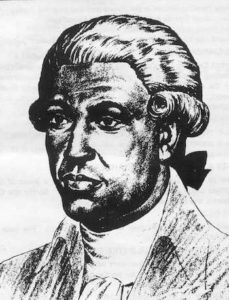
Prince Hall
*Prince Hall was born (circa) on this date in 1748. He was an Afro Barbadian preacher, administrator, mason, and businessman.
Prince Hall was born free in Bridgetown, Barbados, West Indies. His father, Thomas Prince Hall, was a white Englishman, and his mother was a free Black French woman. In 1765, at 17, he worked his passage on a ship to Boston, where he was a leather worker, a trade he learned from his father.
Not much is known of Hall's life before the Revolutionary War. He was the slave of William Hall of Boston. Eight years later, he had acquired real estate and qualified to vote. He later became a preacher in the Methodist Church in Cambridge. His son, Primus, was born in 1756 to Delia, a servant in another household. In 1762, at the age of 27, Hall joined the Congregational Church and married an enslaved woman named Sarah Ritchie. After Sarah's death, he married Flora Gibbs of Gloucester eight years later.
On March 6, 1775, Prince Hall and fourteen other free Negroes of Boston were made Master Masons in an Army lodge attached to one of General Gage's regiments, then stationed near Boston. This lodge granted Prince Hall and his brethren authority to meet as a lodge, to go in procession on St John's Day, and as a lodge to bury their dead, but they could not confer degrees nor perform any other Masonic work.' Hall founded the African Lodge of the Honorable Society of Free and Accepted Masons of Boston. This was the world's first lodge of black Freemasonry and the first society in American history devoted to social, political, and economic improvement.
After the Boston Massacre, Prince Hall was freed; his certificate of manumission read that he was "no longer reckoned a slave, but [had] always accounted as a free man." Hall made his living as a huckster (peddler), caterer, and leather dresser and was listed as a voter and a taxpayer. He owned a small house and a leather workshop in Boston. It is believed that he was one of the six black men of Massachusetts named Prince Hall listed in military records of the Revolution, and he may well have fought at Bunker Hill. A bill he sent to Colonel Crafts indicates that he crafted five leather drumheads for the Boston Regiment of Artillery in April 1777. Hall was active in the affairs of Boston's black community, using his position as the "Worshipful Master" of the black Masons to speak out against slavery and the denial of black rights. For years, he protested the lack of schools for black children and finally established one in his home.
In his last published speech, his charge to the African Lodge in June 1797, Hall spoke of mob violence against blacks: "Patience, I say; for were we not possessed of a great measure of it, we could not bear up under the daily insults we meet within the streets of Boston, much more on public days of recreation. How, at such times, are we shamefully abused, and that to such a degree, that we may truly be said to carry our lives in our hands, and the arrows of death are flying about our heads....tis not for want of courage in you, for they know that they dare not face you man for man, but in a mob, which we despise..." Prince Hall died in 1807 at the age of 72. His lodge honored him a year later by changing its name to Prince Hall Grand Lodge.